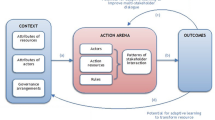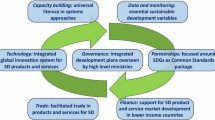Abstract
In this article, the ability of partnerships to generate goods that enhance the quality-of-life of socially and economically deprived urban communities is explored. Drawing on Rawl’s study on social justice [Rawls, J.: 1971, A Theory of Justice (Harvard University Press, Cambridge)] and Sen’s capabilities approach [Sen, A.: 1992, Inequality Re-Examined (Harvard University Press, Cambridge, MA); 1999, Development as Freedom (Oxford University Press, Oxford); 2009, The Idea of Justice (Ellen Lane, London)], we undertake an ethical evaluation of the effectiveness of different approaches to partnership activity in city neighbourhood regeneration. We focus, in particular, on their impact on the social regeneration of disadvantaged communities. Governance of cross-sector partnerships, built upon negotiated values and strong community voice, may result in a greater sense of procedural justice, as well as improvements to orderliness in local neighbourhoods. However, distributive justice, the accumulation of, and access to, goods that enable greater participation in society, remains largely elusive within neighbourhood partnership activity. We conclude that social provision that deals fairly with the causes of disadvantage by enhancing the capabilities of local communities and increasing social capital is likely to be a more effective and sustainable approach for partnerships, despite being a longer-term and more costly endeavour.
Similar content being viewed by others
References
Ackermann, J. M.: 2005, ‘Human Rights and Social Accountability’, Social Development Papers (Participation and Civic Engagement), vol. 86 (The World Bank, Washington, DC).
Amin, A.: 2006, ‘The Good City’, Urban Studies 43(5-6), 1009-1023.
Anand, P., G. Hunter, I. Carter, D. Dowding, F. Guala and M. van Hees: 2009, ‘The Development of Capabilities Indicators’, Journal of Human Development and Capabilities, 10(1), 125-152.
Baeten, G.: 2000, ‘From Community Planning to Partnership Planning: Urban Regeneration and Shifting Power Geometries on the South Bank, London’, GeoJournal, 51(4), 293-300.
Bertland, A.: 2009, ‘Virtue Ethics in Business and the Capabilities Approach’, Journal of Business Ethics, 84(1), 25-32.
Blake, G., J. Diamond, J. Foot, B. Gidley, M. Mayo, K. Shukra and M. Yarnit: 2008, Community Engagement and Community Cohesion (Joseph Rowntree Foundation, York).
Booth, P.: 2005, ‘Partnerships and Networks: The Governance of Urban Regeneration in Britain’, Journal of Housing and the Built Environment, 20(3), 257-269.
Boulding, K.: 1985, The World as a Total System (Beverley Hills, Sage).
Boulding, K.: 1990, Three Faces of Power (Newbury Park, Sage).
Brinkerhoff, J.M. and D.W. Brinkerhoff: 2002, ‘Government-Non-Profit Relations in Comparative Perspective: Evolution, Themes and New Dimensions’, Public Administration and Development, 22(1), 3-18.
Bryson, J.M., B.C. Crosby and M.M. Stone: 2006, ‘The Design and Implementation of Cross-Sector Collaborations: Propositions from the Literature’, Public Administration Review, 66(s1), 44-55.
Butler, T. and G. Robson: 2001, ‘Social Capital, Gentrification and Neighbourhood Change in London; A Comparison of Three South London Neighbourhoods’, Urban Studies, 38(12), 2145-2162.
Carley, M.: 2000, ‘Urban Partnerships, Governance and the Regeneration of Britain’s Cities, International Planning Studies, 5(3), 273-297.
Carley, M.: 2002, Community Regeneration and Neighbourhood Renewal: A Review of the Evidence (Community Scotland, Edinburgh).
Carmon, N.: 1998, ‘Immigrants as Carriers of Urban Regeneration: International Evidence and an Israeli Case Study’, International Planning Studies, 3(2), 207-225.
Coaffee, J.: 2004,’ Re-Scaling Regeneration: Experiences of merging area-based and city wide partnerships in urban policy’, International Journal of Public Sector Management, 17(5), 443-461.
Corcoran, M.: 2006, ‘The Challenge of Urban Regeneration in Deprived European Neighbourhoods: A Partnership Approach’, The Economic and Social Review, 37(3), 399-422.
Coulson, A.: 2005, ‘A Plague on All Your Partnerships: Theory and Practice in Regeneration’, International Journal of Public Sector Management, 18(12), 151-163.
Diamond, J.: 2002, ‘Strategies to Resolve Conflict in Partnerships: Reflections on UK Urban Regeneration’, The International Journal of Public Sector Management, 15(4-5), 296-306.
Diamond, J.: 2010, ‘Context to Globalisation and Regeneration Management’, in J. Diamond, J. Liddle, A. Southern and P. Osei (eds.) Urban Regeneration Management: International Perspectives (Routledge, London), pp. 13-30.
Diamond, J. and A. Southern: 2006, ‘Research into Regeneration: Gaps in our Knowledge Base, International Journal of Sociology and Social Policy, 26(5-6), 22-38.
Donaldson, T. and T. Dunfee: 1999, Ties That Bind: A Social Contracts Approach to Business Ethics, (Harvard University Business News Press, USA).
Downe, J. and S. Martin: 2006, ‘Joined Up Policy in Practice? The Coherence and Impacts of the Local Government Modernisation Agenda’, Local Government Studies, 32(4), 465-488.
Exworthy, M. and S. Halford: 1999, ‘Professionals and Managers in a Changing Public Sector: Conflict, Compromise and Collaboration?’, in M. Exworthy and S. Halford (eds.), Professionals and the New Managerialism in the Public Sector (Open University Press, Buckingham).
Flynn, N.: 2007, Public Sector Management, (Sage, London).
Frug, G.E.: 2001, City Making: Building Communities without Building Walls (Princeton University Press, New Jersey).
Frug, J.: 1996, ‘The Geography of Community’, Stanford Law Review, 48(5), 1047-1108.
Hart, A.: 2003, ‘A Neighbourhood Renewal Project in Dalston, Hackney: Towards a New Form of Partnership in Inner City Regeneration’, Journal of Retail and Leisure Property, 3(3), 237-245.
Hays, S.W. and R.C. Kearney: 1997, ‘Riding the Crest of a Wave: The National Performance Review and Public Management Reform’, International Journal of Public Administration, 20(1), 11-40.
Holmes, K. and Y. Beebeejaun: 2007, ‘City Centre Masterplannning and Cultural Spaces: A Case Study of Sheffield’, Journal of Retail and Leisure Property, 6(1), 29-46.
Hood, C.: 1998, The Art of the State: Culture Rhetoric, and Public Management (Oxford University Press, Oxford).
Hull, A.: 2000, ‘Neighbourhood Renewal: A Toolkit for Regeneration’, GeoJournal, 51(4), 301-309.
HMSO: 2006, Service Transformation: A Better Service for Citizens and Businesses, a Better Deal for Taxpayers (Her Majesty’s Stationery Office, London).
HM Treasury: 2004, Releasing Resourcing to the Front Line: Independent Review of Public Efficiency, Sir Peter Gershon CBE (Her Majesty’s Stationery Office, London).
Jacobs, J.: 2000, The Death and Life of Great American Cities (Pimlico, London).
Jacobs, J.: 2002, Dimensions of Moral Theory: An Introduction to Metaethics and Moral Psychology (Wiley, London).
Johnson, C.: 2005, ‘Strategic Superboards: Improved Network Management Processes for Regeneration’, International Journal of Public Sector Management, 18(2), 139-150.
Johnson, C. and S.P. Osborne: 2003, ‘Local Strategic Partnerships, Neighbourhood Renewal, and the Limits to Co-Governance’, Public Money and Management, 23(3), 147-154.
Lawless, P.: 1994, ‘Partnership in Urban Regeneration in the UK: The Sheffield Central Area Study’, Urban Studies, 31(8), 1303-1324.
Lawless, P.: 2006, ‘Area-based Urban Interventions: Rationale and Outcomes: The New Deal for Communities Programme in England’, Urban Studies, 43(11), 1991-2011.
Lewis, A., F. Amini and R. Lannon: 2000, A General Theory of Love (Random House, New York).
Lin, N.: 2001, Social Capital: A Theory of Social Structure and Action (Cambridge University Press, Cambridge).
Locke, J.: 1948, The Second Treaties of Civil Government and the Letter Concerning Toleration (Basil Blackwell, Oxford).
McIntyre, A.: 2007, After Virtue: A Study in Moral Theory, 3rd edition (Gerald Duckworth, London).
Nevin, B, P. Loftman and M. Beazley: 1997, ‘Cities in Crisis: Is Growth the Answer? An Analysis of the Outcome of the First and Second Rounds of the ‘Single Regeneration Budget Challenge Fund’’, Town Planning Review, 68(2), 145-164.
Newman, J.: 2001, Modernising Governance: New Labour, Policy and Society (Sage, London).
Pollitt, C. and G. Bouckaert: 2004, Public Management Reform: A Comparative Analysis, (Oxford University Press, Oxford).
Portes, A.: 1998, ‘Social Capital: Its Origins and Applications in Modern Sociology’, Annual Review of Sociology, 24(1), 24-48.
Pratchett, L.: 2004, ‘Local Autonomy, Local Democracy and the ‘New Localism’’, Political Studies, 52(2), 358-375.
Putman, R.: 2001, Bowling Alone: The Collapse and Revival of American Community (Simon Schuster, USA).
Rawls, J.: 1971, A Theory of Justice (Harvard University Press, Cambridge).
Roberts, P.: 1999, ‘The Evolution, Definition and Purpose of Urban Regeneration’, in P. Robinson and H. Sykes (eds.), Urban Regeneration: A Handbook (Sage, London).
Robinson, F., K. Shaw and G. Davidson: 2005, ‘Regenerating Places, not People’, Local Economy, 20(1), 13-26.
Rogers, R.: 1999, Towards a Strong Urban Renaissance (Urban Task Force, London).
Rogers, R.: 2005, Towards a Strong Urban Renaissance: The Urban Renaissance six years on (Urban Task Force, London).
Sandoval, G.: 2010, Immigrants and the Revitalization of Los Angeles: Development and Change in Macarthur Park (Cambria Press, New York).
Seitanidi, M. and A. Crane: 2009, ‘Implementing CSR Through Partnerships: Understanding the Selection, Design and Institutionalisation of Nonprofit-Business’, Journal of Business Ethics, 85(s2), 413-429.
Selsky, J. W. and B. Parker: 2005, ‘Cross-Sector Partnerships to Address Social Issues: Challenges to Theory and Practice’, Journal of Management, 31(6): 1-25.
Sen, A.: 1992, Inequality Re-Examined (Harvard University Press, Cambridge, MA).
Sen, A.: 1997, ‘Economics, Business Principles and Moral Sentiments’, Business Ethics Quarterly, 7(3), 5-15.
Sen, A.: 1999, Development as Freedom (Oxford University Press, Oxford).
Sen, A.: 2009, The Idea of Justice (Ellen Lane, London).
Sen, A., N. Stern and J. Stiglitz: 1991, ‘Development Strategies: the Roles of the State and the Private Sector’, Proceedings of the World Bank Annual Conference on Development Economics 1990 (The World Bank, Washington, DC), pp. 421–435.
Sketcher, C, N. Mathur and M. Smith: 2005, ‘The Public Governance of Collaborative Spaces: Discourse, Design and Democracy’, Public Administration, 38, 573-596.
Smith, M. and M. Beazley: 2000, Progressive Regimes, Partnerships and the Involvement of Local Communities, Public Administration, 8(4), 855-878.
Stephenson, C. and D. Wray: 2005, ‘Emotional Regeneration through Community Action in Post-Industrial Mining Communities: The New Herrington Miners’ Banners Partnership’, Capital and Class, 87(Autumn), 175-199.
Tavis, T.M. and L.A. Tavis: 2004, ‘The Person, The Market and the Community’, in B. Hodgson (ed.) The Invisible Hand and the Common Good (Springer, New York).
Thomas, R. and A. Davies: 2005, ‘Theorizing the Micro-Politics of Resistance: New Public Management and Managerial Identities in the UK Public Services’, Organisation Studies, 26(5), 683-706.
Van der Wal, Z., L. Huberts, H. Van der Wal and E. Koltoff: 2006, ‘Central Values of Government and Business: Similarities and Conflicts’, Public Administration Quarterly, 30(3), 313-363.
Warhurst, A.: 2001, ‘Corporate Citizenship and Corporate Social Investment: Drivers of Tri-sector Partnerships’, Journal of Corporate Citizenship, 1, 57-73.
Warner, M. and R. Sullivan: 2004, Putting Partnerships to Work: Strategic Alliances for Development Between Government, The Private Sector and Civil Society (Greenleaf Publications, Sheffield).
Williams, G.: 2006, ‘Collaborative Partnerships and Urban Change Management: The Renewal of Manchester City Centre’, International Journal of Sociology and Social Policy, 26(5-6), 194-206.
Author information
Authors and Affiliations
Corresponding author
Rights and permissions
About this article
Cite this article
Cornelius, N., Wallace, J. Cross-Sector Partnerships: City Regeneration and Social Justice. J Bus Ethics 94 (Suppl 1), 71–84 (2010). https://doi.org/10.1007/s10551-011-0780-6
Published:
Issue Date:
DOI: https://doi.org/10.1007/s10551-011-0780-6




